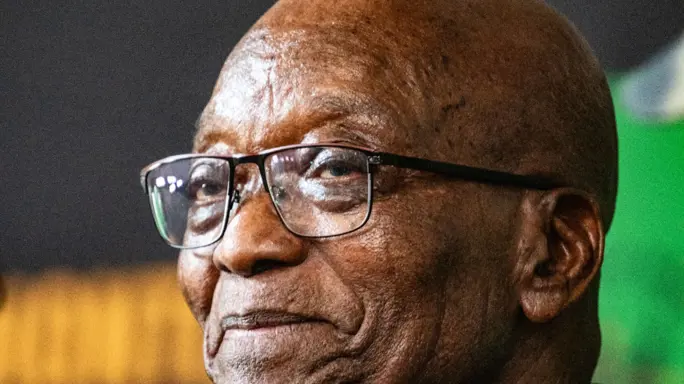 Former President Jacob Zuma addresses members of the media under the banner of new party uMkhontho weSizwe on 16 December 2023. Picture: Kayleen Morgan/ Eyewitness News
Former President Jacob Zuma addresses members of the media under the banner of new party uMkhontho weSizwe on 16 December 2023. Picture: Kayleen Morgan/ Eyewitness News
South Africa's former President Jacob Zuma has thwarted attempts to stop him or his new party, uMkhonto weSizwe (MK), from contesting the general election at the end of May. The latest victory came on Monday in the Durban High Court, where the governing African National Congress (ANC) tried to force MK to drop its name and logo. The ANC argued that trademark law had been breached and that the use of the name, which translates as Spear of the Nation, would lead to voter confusion in the upcoming May polls. The judge disagreed, stating that it was a big victory for MK politically and financially.
The high court ruling is campaign gold for MK, allowing activists to crow about their victory, even if the governing party says it will appeal against the ruling. However, the ruling also shows how much MK relies on the charismatic appeal of Mr. Zuma, a former ANC stalwart who once served in its armed wing. The allegations of corruption he faces, but denies, have not affected his huge popularity in his home province of KwaZulu-Natal.
High court judge Mahendra Chetty mainly dismissed the application on the grounds that the ANC had left the legal action too late and should have approached the electoral court, not the high court. MK was registered as a party in September, but it was only when Mr. Zuma came out in support of it in December that the ANC woke up to the threat. The electoral court rejected the ANC's argument that the party had not met the official registration criteria.
The electoral court has also overturned the electoral commission's ban on Mr. Zuma's candidacy for a parliamentary seat. The constitution bars people from holding public office if convicted of a crime and sentenced to more than 12 months in prison. The electoral commission had argued that as Mr. Zuma was sentenced to 15 months in jail in 2021 for failing to testify in a corruption investigation he did not qualify.
Mr. Zuma has a chequered record when it comes to courtrooms, so the recent rulings are a boon for him. The judiciary seems to want to avoid interfering and leave the electorate to decide on the fate of the former president and his party.
The ruling will also ease political tensions, as the ANC could lose its outright majority in the national parliament - currently 57% - for the first time in 30 years, as well as in the KwaZulu-Natal legislature. South Africans seem spoiled for choice this time - in addition to the usual national and provincial ballots, voters are expected to cast, for the first time, a third vote that includes independent candidates who are not aligned to established parties.
The electoral commission has lodged an urgent appeal with the highest court, the Constitutional Court, in a bid to overturn the electoral court's verdict. Some are concerned that this ping-pong in the courts is distracting from the bigger issues facing South Africa - high unemployment, the cost-of-living crisis, lack of electricity, and criminal violence.


